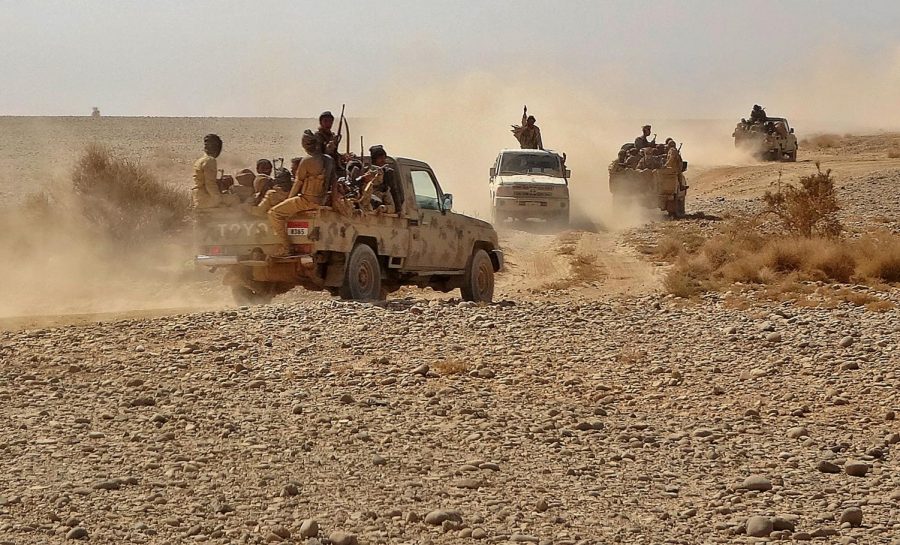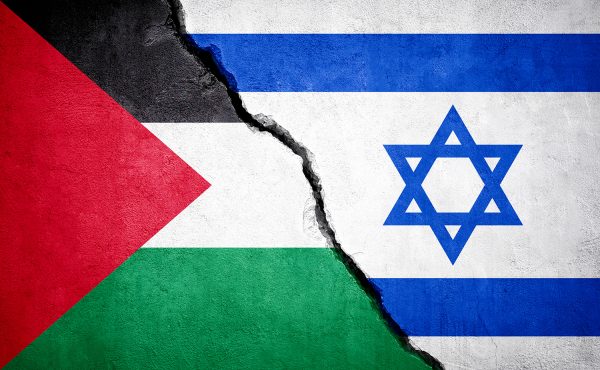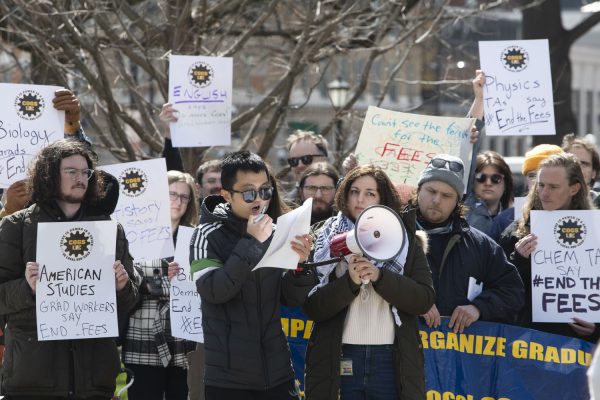Guest Opinion | Silence is Complacency: 5 reasons why Iowa students must oppose the war on Yemen
On Jan. 25, organizations worldwide are going to participate in No to War on Yemen—here’s why Iowa students need to join.
Fighters ride in pickup trucks as forces loyal to Yemen’s Saudi-backed government clash with Huthi rebel fighters around the strategic government-held “Mas Camp” military base, in the al-Jadaan area about 50 kilometers northwest of Marib in central Yemen, on November 22, 2020.
January 23, 2021
In addition to Jan. 25 being the first day of classes for Hawkeyes this year, thousands around the world will be taking a stand to say No to the utterly devastating War on Yemen. Over 300 organizations worldwide, including UI student organization Peace by Peace, join the call to protest. Here’s why:
- Yemen is facing the worst humanitarian crisis in the world… on top of a deadly pandemic.
No exaggeration—Yemen is facing the worst humanitarian crisis in the world. Exasperated by history’s worst cholera outbreak, bombings, and near-famine, more than 230,000 people died since the start of the war. Yemenis faced nearly 100 civilian casualties each week in 2018 due to air strikes, militant attacks, starvation, and medical shortages. More than 24 million people will need humanitarian assistance in 2021 — 12 million being children. As a result of the aid and food blockade imposed by the Saudi-led coalition, the country could lose an entire generation of children due to hunger. At present, a child dies every 10 minutes because of a preventable disease. The pandemic aggravates this disaster as Yemenis are more vulnerable to COVID-19 due to lacking personal protective equipment and immunity-building resources.
- The United States is complicit.
The U.S. directly supported the instigators of this violence. U.S. ally Saudi Arabia imposed a land, sea, and air blockade on Yemen at the start of the war to restrict support for its opposition, causing food insecurity. While 80 percent of the population depends on aid, only 30 percent of Yemenis have received it as the U.S., Saudi Arabia, and the United Arab Emirates continue to slash UN funding toward Yemen. More outrageously, the U.S. offers military and political support to Saudi Arabia’s coalition through arms sales and its own drone strikes in Yemen. The U.S. continues to be the world’s top arms exporter while Saudi Arabia is America’s top buyer. We need to pressure our policymakers in stopping support for the Saudi-led coalition in Yemen.
- Our demands align with peace and security for all.
On the Global Day of Action for Yemen, we will rally together to assert four demands:
- Stop foreign aggression on Yemen
- Restore all aid to Yemen and reverse the Houthi foreign terrorist designation
- Lift the blockade on Yemen and open all land and sea ports
- Stop arming Saudi Arabia and the United Arab Emirates
If the U.S. meets these demands, we can immediately end this brutal war and stop the death and destruction instigated by the warring parties. Not only do these demands strictly focus on protecting human rights, but they ensure that the U.S. explicitly opposes genocide.
- Past and present Hawkeyes care.
“Hunger Ward” is a documentary directed by Oscar and Emmy-nominated Skye Fitzgerald that captures the inside of two feeding centers in Yemen. Coincidentally—Michael Scheuerman—UI class of 1988, was the producer. Alumni like Scheuerman are advocating against the war, and you can too. As the “first-in-the-nation” state, we have an extensive culture of political participation. From vehemently protesting the Vietnam and Iraq Wars to having the first gay student organization on a public university in the nation, UI students are not complicit to injustices. We ought to lead by example for future generations of students, just as past generations have done.
- It’s easy to get involved
Saying No to the War on Yemen takes little effort, but your impact is huge. Attending the Global Online Rally on Jan. 25 is the first step. To stay informed about other opportunities for advocacy, follow @students4yemen and @peacebypeace on Instagram, Facebook, and Twitter! For more, visit https://endtheyemenwar.carrd.co/, which offers more information about the crisis, donations, and contacting your representatives to end the war. Finally, it takes seconds to share the hashtag #YemenCantWait on social media.
Not only should you spend this Monday reading syllabi, but you should also partake in the Global Day of Action for Yemen. We must show governments that opposition to violence and injustice is the global consensus. To influence peace from 8,000 miles away, we need to act now. Yemen can’t wait.
—Amna Haider and Lauren Salloum, University of Iowa Undergraduate Students













